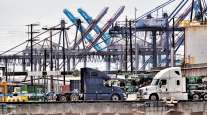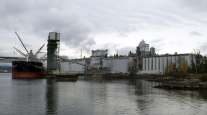Security Forces Deployed as Trucker Strike Upends Brazilian Economy

Brazil sank further into chaos May 25 as the fifth day of a nationwide truckers’ strike prompted the deployment of national security forces amid warnings of a calamity in one of world’s largest cities and potentially devastating livestock losses.
Sao Paulo, a megacity that’s home to more than 12 million people, declared a state of emergency and warned that shortages caused by the strike may cause a state of public calamity, while export group ABPA said a billion chickens and 20 million swines may die in coming days due to a lack of feed.
President Michel Temer said he’s called for the deployment of national security forces to unblock roads and asked governors to do the same.
“Those who act in a radical manner are harming the population and they will be held responsible,” Temer said in a televised national address May 25.

Striking truckers protest rising fuel costs on the highway BR-040 in Duque de Caxias, Brazil, May 25. Thousands of Brazilian truckers angry over fuel price hikes blocked roads on Friday, the fifth day of a strike that led thousands of schools to shutter, long lines to form at gas stations and several flights to be canceled. (Silvia Izquierdo/AP)
RELATED: Brazilian trucker strike starting to wear on economy
While the government said that eight of 10 unions agreed to a proposal that would suspend price increases and lower taxes on diesel, the country’s truckers’ confederation issued a statement May 25 saying it had committed to just “pass along” the offer, and not to end the strike.
As part of the accord announced May 24, diesel prices, which had been adjusted daily according to market rates, will now be fixed for 30 days. The government and state-run oil company Petrobras will split any extra costs.
Still, truckers group Abcam — which didn’t take the government’s deal — said the number of highway blockades rose to 521 on May 25 from 402 the day prior. Local media reported that drivers continued protesting in at least 14 states. Abcam represents about 700,000 of roughly one million self-employed truck drivers.
Chief of Staff Eliseu Padilha told reporters May 25 that strike will be gradually demobilized. “We’ve fulfilled our part of the agreement and expect them to fulfill theirs,” referring to truckers’ unions. “It’s a slow process.”
Nationwide Chaos
Authorities are struggling to calm the chaos let loose by the strike that erupted Ma y21, set off by fuel-price increases of about 50% over a year. Temer fumbled initial attempts to pacify the situation. Petrobras cut the price of diesel by 10% for two weeks, but that retreat spooked investors and also failed to appease the truckers.
On May 25, there were signs of further damage to Latin America’s largest economy. Carmakers were due to stop production lines, while airlines notified customers of flight cancellations due to lack of fuel in several of the country’s main airports.
The largest port in Latin America was said to be running out of soybeans.
Brazil, which is larger than the continental U.S., is specially vulnerable to disruption in transportation. It relies heavily on trucks to move cargo as it has only a small network of railways that cater mostly to shipping raw materials such as iron ore or soybeans.
With assistance from Rachel Gamarski, Bruce Douglas and Robert Jameson.




